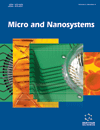-
s Hybrid Model-Based and Data-Driven Solution for Uncertainty Quantification at the Microscale
- Source: Micro and Nanosystems, Volume 14, Issue 4, Dec 2022, p. 281 - 286
-
- 01 Dec 2022
Abstract
Background: Due to their size, microelectromechanical systems (MEMS) display performance indices affected by uncertainties linked to the mechanical properties and to the geometry of the films constituting their movable parts. Objective: In this perspective, a recently proposed multiscale and hybrid solution for uncertainty quantification is discussed. Methods: The proposed method is based on the (deep) learning of the morphology-affected elasticity of the polycrystalline films and of the microfabrication-induced defective geometry of the devices. The results at the material and at the device levels are linked through a reduced-order representation of the response of the entire device to the external stimuli, foreseen to finally feed a Monte Carlo uncertainty quantification engine. Results: Preliminary results relevant to a single-axis resonant Lorentz force micro-magnetometer have shown a noteworthy capability of the proposed multiscale deep learning method to account for the mentioned uncertainty sources at the microscale. Conclusion: A promising two-scale deep learning approach has been proposed for polysilicon MEMS sensors to account for both materials- and geometry-governed uncertainties and to properly describe the scale-dependent response of MEMS devices.


